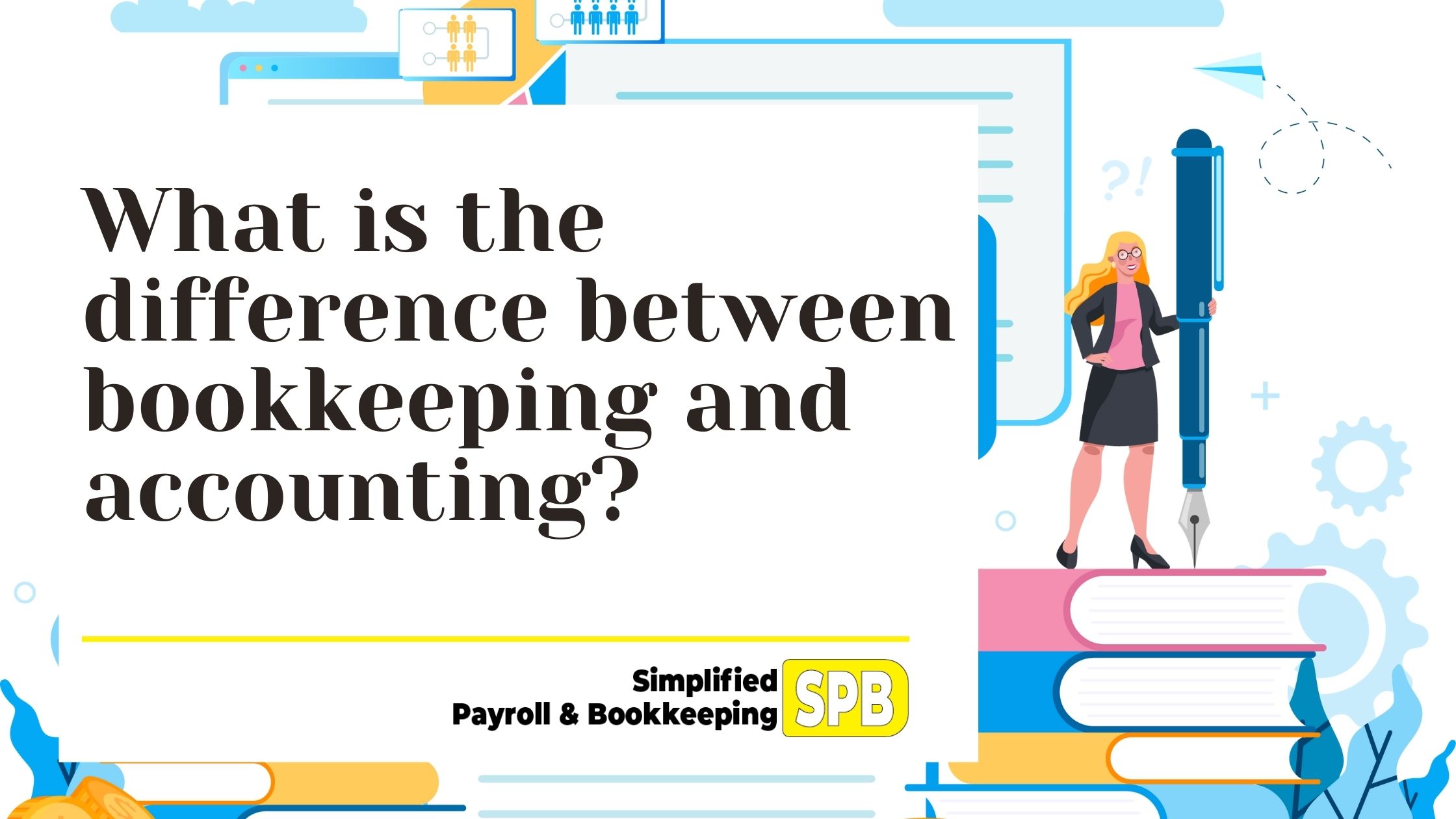What is the difference between bookkeeping and accounting? For any business to be successful, it must keep an accurate record of its financial transactions. They need to know how much money they have made and how much they have spent, as well as the expenses, salaries, and profits that those figures entail. This is why businesses hire people with knowledge of bookkeeping and accounting.
Bookkeeping and accounting are about recording the flow of money in and out of a business or organization.
Now you know what a bookkeeper does – Contact us:
What is bookkeeping?
Bookkeeping is the practice of recording financial data in a systematic manner with the objective of summarizing and reporting that information to managers, owners (shareholders), tax authorities, etc. It has been around as long as there have been people and business transactions. Since all businesses deal with money and the inputs and outputs involve someone’s personal wealth, understanding what assets an organization possesses is vital for knowing how well it is doing and whether or not it will survive.
The bookkeeper maintains those records on a daily basis by entering price/quantity combinations into specific columns in one or more journals (books of original entry). Then they enter those numbers into ledgers (books of original entry) where they undergo further analysis such as subtotaling, totaling, balancing, etc.
Bookkeepers are the backbone of any business and have been used to maintain records for thousands of years in almost every civilization. In ancient Rome, bookkeeping was taught as a minor subject along with arithmetic and geometry at schools in Greece from around 50 B.C. In 1300 A.D., Florence even had a guild specifically dedicated to training people for employment as accountants (a similar organization existed in Paris).
Different types of organizations require different levels of bookkeeping: some may need accounts receivable and payable ledgers while smaller businesses only need journals and ledgers. Regardless, all good bookkeepers must be well-organized; they must understand that their job is about more than simply making entries-it is also about providing information that can be used to make business decisions.

Today, bookkeeping is done on computers and most companies no longer require the services of a full-time professional. Many employers outsource or employ part-timers so they don’t have to pay for health insurance and other benefits only full-time employees receive. However, there are still many organizations in which a dedicated bookkeeper is necessary; these include legal, medical, educational, political, and religious institutions.
Interested in payroll and bookkeeping services in Georgetown, TX? For more inquiries, you may contact us at 737-931-1413 or email us at info@SimplifiedPB.com.
Subscribe to our YouTube Channel!
What is accounting?
Accounting is the process of gathering, summarizing, analyzing and communicating financial information. It provides a picture of an organization’s financial position at a particular point in time as well as its operations/trends over time through the use of financial statements.
Unlike bookkeepers who record transactions after they have occurred, accountants must understand how to record those transactions before they actually happen; this is known as accrual accounting. This allows organizations to make informed decisions about their future based on what has (or will) actually happened rather than what people think may happen (e.g., the best estimate). Accounting involves not only recording but also classifying and summarizing that raw data into meaningful information that managers can use to decide whether or not to approve investment opportunities, start new ventures, expand/contract operations, etc.
Accounting provides information about an organization’s financial situation and helps managers decide where to take the business in the future. It demonstrates what has happened so far this year (up until the end of the quarter) while also providing some idea of how it will end up at year-end based on what is known about how it has progressed thus far. Accounting serves as a basis for making decisions that affect economic factors such as assets, liabilities, income, expenses, capital, dividends, etc. It also assists in ensuring compliance with laws concerning finance.
Accountants use many different tools when fulfilling their duties: accounting software programs are typically used while accountants rely more on knowledge and experience than anything else. Like any profession, accounting requires ongoing education; an accountant always strives to increase their skills and knowledge base in order to provide the best service possible. However, there are some basic principles of accounting that form a foundation from which all other concepts stem:
– Revenue is recognized when earned (e.g., cash received from customers).
– Expenses are recognized when incurred (e.g., raw material purchased for resale).
– The matching principle requires that expenses be matched with revenues when they occur in nature rather than at year-end through accrual basis accounting.
– Accrual basis accounting matches revenues and expenses even if they aren’t paid in a given period. This makes it possible to produce monthly financial statements.
– Assets, Expenses, and Liabilities must all be matched with the related revenues, expenses, or owners’ equity on a regular and systematic basis (monthly and yearly). For example, an asset is not purchased on December 31st; instead, it is purchased on January 2nd and used for five years. Each year the accountant will report revenue offset by an expense; those transactions will occur every month though they won’t appear as one lump sum at the end of the period (which would be misleading as it wouldn’t portray how much was actually consumed each month).
In short, accountants have a duty to provide high-quality information that enables their clients to make decisions about investment opportunities, expand/contract operations, etc.

What are the 10 differences between bookkeeping and accounting?
Based on the above definitions, we can classify the differences between accounting and bookkeeping into 10 basic categories:
1. Order of Events: bookkeepers record the transactions after they have occurred while accountants must understand how to record those transactions before they actually happen; this is known as accrual accounting. This allows organizations to make informed decisions about their future based on what has (or will) actually happened rather than what people think may happen (e.g., the best estimate).
2. Accuracy vs. Immediacy: Accountants provide information about an organization’s financial situation and help managers decide where to take the business in the future, but that information comes with a time lag: quarterly and yearly statements must be assembled and combined into a complete financial picture and then compared against past records and projections. Bookkeepers only work current data; there is no concern with the past.
3. Reliability vs. Relevance: Bookkeepers record and present information as it occurs (e.g., cash received from customers) and do not need to know if those transactions will impact future accounting; they focus on what has happened now, rather than later. Accountants must be familiar with how those same transactions impact financial statements at a later date (i.e., relevance). Accountants also look at past events as well as current ones since they work with projections as well–which requires looking at trends in previous periods to determine future possibilities.
4. Legal Basis vs. Duty: An accountant is required to follow GAAP standards and provide their clients with reliable relevant information that helps them make informed decisions. Bookkeepers can keep any books they choose and often have no legal obligation to provide correct information about an organization’s financial situation.
5. Single vs. Multiple: In a given period, bookkeepers only record transactions for a single entity (e.g., an employee earns $1,000 in cash for 100 hours of work). Accountants must be able to process multiple accounts that come from different sources simultaneously (e.g., one business reports revenue through its income statement while another uses a balance sheet to report revenue). That means accountants need to understand how those different accounts interact within the accounting equation across time as well as within the current reporting period (i.e., now).
6. Real vs. Nominal Unit of Measure: an accountant deals with nominal accounting, which means that all transactions are recorded at face value (i.e., the actual amount of money received or paid for something). Bookkeepers deal with real accounting, which means that accounts are adjusted to recognize inflation/deflation of the currency used.
7. Revenues vs. Expenses: Bookkeepers only work with revenues and expenses while accountants may need to separate those two types of transactions into distinct accounts depending on what is being purchased or sold. For example, property tax is revenue that appears on the income statement while interest expense would be listed as an operating expense on the income statement.
8. Assets vs. Liabilities: Rather than recording transactions on both sides of the balance sheet as they occur, bookkeepers only record those transactions on the left-hand side (i.e., the assets section). Accountants must be able to work with both sides of a company’s ledger and understand how those different accounts interact within the accounting equation across time as well as within the current reporting period.
9. Fundamental vs. Technical Analysis: accountants analyze financial information using both fundamental and technical analysis techniques; this allows them to assess a company’s value based on what is currently happening now as well as what has happened in the past. Bookkeepers make no use of either technique since their focus is only on current events rather than future ones.
10. Formality vs. Informality: In order to make sure that all accounting standards are met, accountants must have a formal structure for their work. Bookkeepers do not have the same requirement since they only record transactions as they occur.
Don’t hesitate to contact us!
In summary, a bookkeeper is a person who records the financial transactions of a single company while an accountant works with multiple companies and needs to be able to analyze a variety of accounts that come from different sources. Accountants focus on what happened in the past, while bookkeepers concern themselves with what is going on currently.











